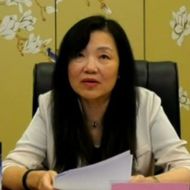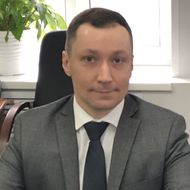HSE University Launches Consortium of BRICS Law Schools

The HSE Faculty of Law hosted an online meeting with law schools and expert centres from BRICS countries. The purpose of the event was to join efforts to advance legal science and practice for the benefit of the organization. To this end, at the initiative of the Dean of the Faculty of Law Vadim Vinogradov, a Consortium of BRICS Law Schools was established, comprising representatives of leading higher education institutions from a number of countries.
Members of the new Consortium include the Federal University of Minas Gerais (Brazil), BRICS Policy Centre (Brazil), O.P. Jindal Global University (India), Shanghai University of Political Science and Law (China), East China University of Political Science and Law (China), University of Pretoria (South Africa), and Alexandria University (Egypt).
Alexander Larichev, Deputy Dean for Research at the Faculty of Law, emphasised in his opening address that BRICS has been developing rapidly. Therefore, harmonising approaches to legal regulation, exchanging knowledge and experience, and implementing joint projects in the field of law are crucial for achieving the priority goals outlined in the BRICS summit declarations.
'The BRICS Law Schools Consortium is intended to serve as a platform for mutually beneficial cooperation, exchange of knowledge and experience, and joint project implementation. In today's world, where legal systems are facing new challenges, our collaboration will not only help us overcome these challenges but also foster the development of the legal culture in our countries. We believe that today's meeting will mark the beginning of fruitful interaction among like-minded people who share the core values of the BRICS group —equality and mutual respect, openness and commitment to consensus, and willingness to collaborate in addressing shared challenges,' noted Alexander Larichev.
Alyona Bernyukevich, Director of the International Cooperation Centre at the HSE Faculty of Law, provided more details about the purpose of the Consortium. She focused on the key areas of engagement among its members, namely education, research, and expertise.
'The Consortium aims to strengthen connections among legal experts. The development of the BRICS legal field will benefit both academically and practically from the emergence of such an integrated and competent legal community,' she stressed.

Liu Xiaohong
Representatives from foreign universities discussed their main areas of activity, including educational programmes, research projects, and international cooperation efforts. All speakers also acknowledged that law schools in BRICS share overlapping interests, ensuring that their engagement will be productive and mutually beneficial. Professor Liu Xiaohong, President of the Shanghai University of Political Science and Law (China), expressed her commitment to supporting collaboration within the framework of the Consortium.
During the discussion, the participants deliberated on a roadmap for further development of the association and the organisational aspects of future cooperation. The meeting moderator, Deputy Director of the HSE Institute of National and Comparative Legal Studies Natalia Galkina, thanked all attendees for supporting the Faculty of Law's initiative and encouraged colleagues to engage in active and systematic cooperation and implementation of collaborative plans.
See also:
‘The Trip Exceeded All Our Expectations’: HSE Students Take Part in BRICS Youth Innovation Summit 2025
The BRICS Youth Innovation Summit 2025 was held in Cape Town on April 10–11, 2025. The event was attended by political and business leaders from Brazil, Russia, India, China, and South Africa. The summit focused on the theme ‘Innovating the Future: Technology for Sustainability and Social Good,’ under which the participants presented their projects. Students of the Faculty of Economic Sciences have shared their experiences of the trip to South Africa, their presentations at the BRICS summit, penguin encounters, and more!
HSE’s Education Observatory Establishes Research Network Across All BRICS Countries
The International Education Observatory initiative, launched by HSE University to focus on expert evaluation, analytics, and joint scientific research, has successfully completed the formation of a research network across all BRICS nations. South Africa was the final link, with the University of Pretoria and the University of the Witwatersrand joining experts from Russia, China, India, and Brazil.
The Future Through the Eyes of Young Scientists
A delegation of teachers and students from the HSE Campus in Nizhny Novgorod participated in the IV Young Scientists Congress and the IX BRICS Young Scientists Forum held in Sochi. These two key events of the Russian Decade of Science and Technology brought together representatives of the academic and university community, state corporations, private businesses, and public organisations to envision the future of Russian science through the lens of the younger generation.
‘We Need Our Own AI Models Trained on Local Data’
The digitalisation of the economy and the rapid development of artificial intelligence (AI) technologies pose new challenges for antitrust authorities worldwide. Major players in the AI market, equipped with significant resources, can block new entrants and set anti-competitive prices. Additionally, the use of AI raises increasingly complex ethical questions for which the global community has yet to develop answers. These and other issues were discussed at the Third BRICS+ Digital Competition Forum.
‘It Is Hard to Imagine High-Level Interpretation Being Entrusted to a Machine’
In 2024, Russia chairs BRICS, an international organisation comprising nine countries. Throughout the year, dozens of forums, working group meetings, and BRICS sessions took place across various Russian cities. As an interpreter, Ksenia Prosyukova, Associate Professor at the HSE School of Foreign Languages and Candidate of Science (PhD) in Pedagogy, participated in several BRICS events. In an interview, she discussed the personal responsibility of working at high-level events, the challenges and prospects of her profession, and how HSE University trains in-demand translators.
BRICS Representatives Discuss the Development of Statistics in Member Countries
The significance of statistics in today’s digital age has reached a new level. Many decisions at government and business levels are based on data analysis. However, there is a mixed perception of official statistics, which negatively affects trust in public policies. The heads of BRICS statistical agencies discussed this issue and ways to address it at a forum in Kazan, where a representative from HSE University also participated in the event.
‘Geographical Distance No Longer a Problem’: ISSEK Fosters Cooperation with Think Tanks in BRICS Countries
In September, the HSE Institute for Statistical Studies and Economics of Knowledge hosted an international working meeting with representatives from Brazilian, Egyptian, and Indian think tanks. The participants discussed opportunities for cooperation, including joint surveys, comparative studies, databases, and publications on foresight, technology, and innovation. It was also decided to draft a multilateral agreement to establish the BRICS Foresight Association.
HSE Experts Take Part in the First International Workshop on Technological Sustainability of BRICS
On September 19–20, Skoltech hosted the First International Workshop on Technological Sustainability of BRICS: University-Industry Partnerships, organised jointly with HSE University Human Capital Multidisciplinary Research Center. The meeting was held as part of the BRICS working group on technology foresight and science and technology studies.
HSE Researchers to Develop BRICS Exchange System Together with Chinese Experts
HSE University International BRICS Competition Law and Policy Centre and the Competition Policy and Assessment Centre founded by the State Administration for Market Regulation of China signed a cooperation agreement. The parties agreed to come up with proposals for the development of exchange trade in goods and raw materials between Russia, China, and the BRICS countries.
‘What Makes BRICS Effective Is Its Diversity’: HSE University Representatives Begin Work at EEF
HSE University Vice Rector Victoria Panova spoke at the Eastern Economic Forum (EEF 2024) that began in Vladivostok. The topic of her speech was the expansion of BRICS.





